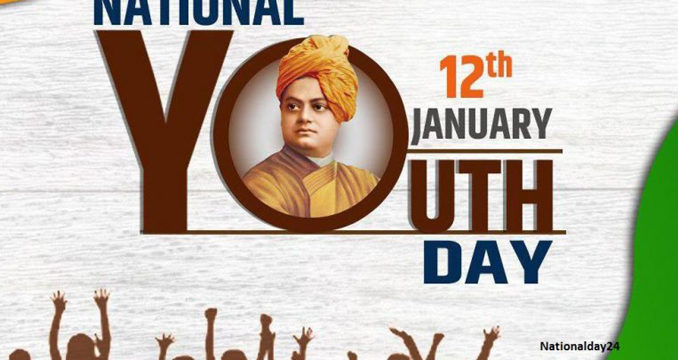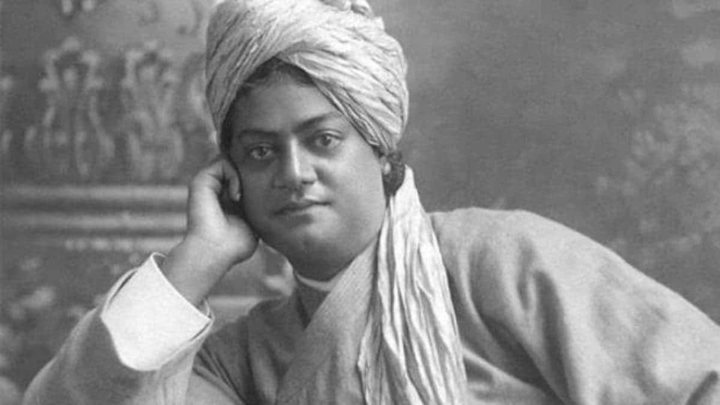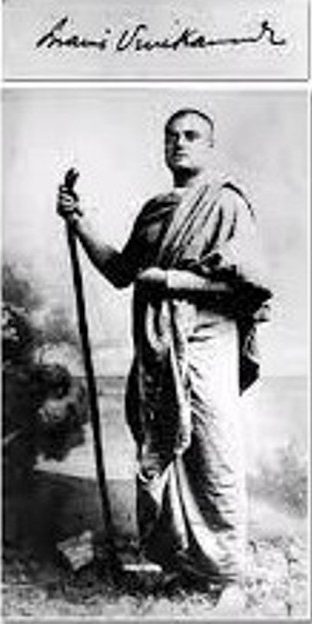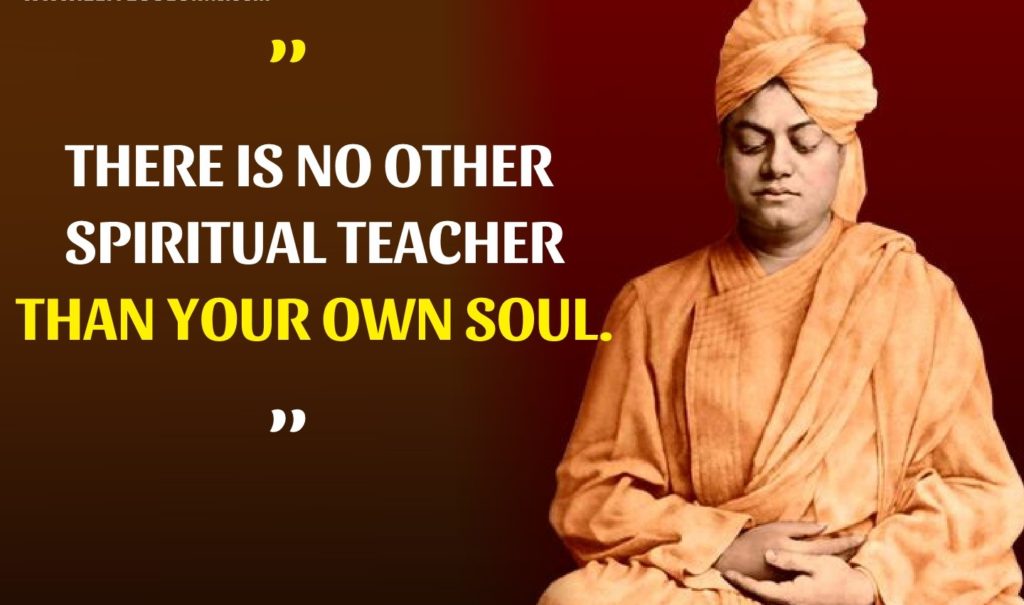

“Vivekananda, original name Narendranath Datta, Datta also spelled Dutt, (born January 12, 1863, Calcutta [now Kolkata]—died July 4, 1902, near Calcutta), Hindu spiritual leader and reformer in India who attempted to combine Indian spirituality with Western material progress, maintaining that the two supplemented and complemented one another. His Absolute was a person’s own higher self; to labor for the benefit of humanity was the noblest endeavor.” -Encyclopedia Britannica
Early Life and Education

Born Narendranath Dutta, into an affluent Bengali family in Calcutta, Vivekananda was one of the eight children of Vishwanath Dutta and Bhuvaneshwari Devi. He was born on January 12, 1863, on the occasion of Makar Sankranti. Father Vishwanath was a successful attorney with considerable influence in society. Narendranath’s mother Bhuvaneshwari was a woman endowed with a strong, God-fearing mind who had a great impact on her son. As a young boy, Narendranath displayed sharp intellect. His mischievous nature belied his interest in music, both instrumental as well as vocal. He excelled in his studies as well, first at the Metropolitan institution, and later at the Presidency College in Calcutta. By the time he graduated from the college, he had acquired a vast knowledge of different subjects. He was active in sports, gymnastics, wrestling and body building. He was an avid reader and read up on almost everything under the sun. He perused the Hindu scriptures like the Bhagvad Gita and the Upanishads on one hand, while on the other hand he studied western philosophy, history and spirituality by David Hume, Johann Gottlieb Fichte and Herbert Spencer.
He did his schooling at Ishwar Chandra Vidyasagar’s Metropolitan Institution (1871). Then he attended Presidency University (Kolkata) and General Assembly’s Institution (Scottish Church College, Kolkata). Swami Vivekananda died at an early age of 39 years on July 4, 1902, due to rupture in the blood vessel of his brain. His disciples say that he attained Mahasamadhi (the act of consciously and intentionally leaving one’s body at the moment of death) while meditating.
Swamiji was never married, as He considered all women to be the manifestation of the Divine Mother of the Universe. All women were his Mother in that sense. When Swami Vivekananda went to America, a woman expressed his desire to marry him. When Swami Vivekananda asked the woman about the reason for her intention. Then the woman said she was very fascinated with the wisdom of Swamiji and wished for such a wise child from him. On this, Swamiji told the woman that since she is fascinated only by his wisdom, there is no problem. Swami Vivekananda said “I understand your wish. It will take a long time to get married and bring a child into this world and then to know whether he is intelligent or not. There is no guarantee that this would happen. Instead, I can give you a suggestion to fulfill your wish immediately. You accept me as your child. In this way, you will become my mother and thus your desire to have a wise child like me will also be fulfilled”.
Spiritual Crisis and Relationship with Ramkrishna Paramhansa
Although Narendranath’s mother was a devout woman and he had grown up in a religious atmosphere at home, he underwent a deep spiritual crisis at the start of his youth. His well-studied knowledge led him to question the existence of God and for some time he believed in Agnosticism. Yet he could not completely ignore the existence of a Supreme Being. He became associated with Brahmo Movement led by Keshab Chandra Sen, for some time. The Bramho Samaj recognized one God unlike the idol-worshipping, superstition-ridden Hinduism. The host of philosophical questions regarding the existence of God roiling through his mind remained unanswered. During this spiritual crisis, Vivekananda first heard about Sri Ramakrishna from William Hastie, the Principal of the Scottish Church College.
Earlier, to satisfy his intellectual quest for God, Narendranath visited prominent spiritual leaders from all religions, asking them a single question, “Have you seen God?” Each time he came away without a satisfying answer. He put forward the same question to Sri Ramkrishna at his residence in Dakshinewar Kali Temple compounds. Without a moment’s hesitation, Sri Ramakrishna replied: “Yes, I have. I see God as clearly as I see you, only in a much deeper sense.” Vivekananda, initially unimpressed by the simplicity of Ramkrishna, was astonished with Ramakrishna’s reply. Ramakrishna gradually won over this argumentative young man with his patience and love. The more Narendranath visited Dakshineshwar, the more his questions were answered.
Spiritual Awakening
In 1884, Naredranath underwent a considerable financial distress due to the death of his father as he had to support his mother and younger siblings. He asked Ramakrishna to pray to the Goddess for the financial welfare of his family. On Ramakrishna’s suggestion he himself went to the temple to pray. But once he faced the Goddess he could not ask for money and wealth, instead he asked for ‘Vivek’ (conscience) and ‘Bairagya’ (reclusion). That day marked the complete spiritual awakening of Narendranath and he found himself drawn to an ascetic way of life.
Life of a Monk

During the middle of 1885, Ramakrishna, who had been suffering from throat cancer, fell seriously ill. In September 1885, Sri Ramakrishna was moved to Shyampukur in Culcutta, and a few months later Narendranath took a rented villa at Cossipore. Here, he formed a group of young people who were ardent followers of Sri Ramakrishna and together they nursed their Guru with devoted care. On 16 August 1886, Sri Ramakrishna gave up his mortal body. After the demise of Sri Ramakrishna, around fifteen of his disciples including Narendranath began to live together in a dilapidated building at Baranagar in North Calcutta, which was named Ramakrishna Math, the monastic order of Ramakrishna. Here, in 1887, they formally renounced all ties to the world and took vows of monkhood. The brotherhood rechristened themselves and Narendranath emerged as Vivekananda meaning “the bliss of discerning wisdom”. The brotherhood lived on alms donated voluntarily by patrons during holy begging or ‘madhukari’, performed yoga and meditation. Vivekananda left the Math in 1886 and went on a tour of India on foot as a ‘Parivrajak’. He travelled the breadth of the country, absorbing much of the social, cultural and religious aspects of the people he came in contact with. He witnessed the adversities of life that the common people faced, their ailments, and vowed to dedicate his life to bring relief to these suffering. Vivekananda says “knowing God is a deep human necessity. Those who deny this fact have been proven wrong. Therefore, so long as there is fear of death in the world, there shall be faith in God. The concept of God is a fundamental element in the human constitution. In the Vedanta, Sat-chit-ananda (Existence-Knowledge-Bliss) is the highest concept of God”.
Swami Vivekananda was a Hindu monk, a spiritual leader and reformer in India who attempted to combine Indian spirituality with Western material progress, maintaining that the two supplemented and complemented one another. To him, The Absolute was a person’s own higher self; and to labor for the benefit of humanity was the noblest endeavor. Born on January 12, 1863 in Calcutta, he died July 4, 1902 near Calcutta). His original name was Narendranath Datta.
Swami Vivekananda on The Philosophy of Life.
He was a youth icon who was well respected even by much older wiser people. He says everyone has a philosophy to apply in their life. Due to lack of proper education and consequent ignorance about whether such chosen philosophy is good or not, many people go astray. Many are not inquisitive and so remain content with their situations, howsoever crude or selfish. Then, some philosophies may not be adaptable in modern times and some may be too far-fetched, thereby unattainable.The majority set sensual pleasures as their goal. Some would do anything to gain position, power, name, fame, and so on because they think these are the greatest objectives to attain. Each group has a set of arguments to justify their views. However, we are shown by sages and saints that the path to express our infinite possibilities and reach a state that is universally valued and respected. Swamiji says “The lives of Buddha, Mahavira, Christ, Sri Ramakrishna, and many other great persons have demonstrated this truth”.
While conducting a ‘Bhakti-Yoga’ class in New York, on 20th of January 1896, Swamiji narrated the incidents pertaining to Guru Nanak Sahebji whereby Guruji emphasized upon the paramount significance of mindful honest prayer, when the Guru visited the Arabic world and exposed the hypocrisy during the prayer service led by preachers.
Swami Vivekananda and his 1893 Lecture
https://www.artic.edu/swami-vivekananda-and-his-1893-speech

Swami Vivekananda burst upon the global stage because of his famed speech on September 11, 1893, at the first World Parliament of Religions in Chicago. In his groundbreaking speech to the 1893 World’s Parliament of Religions, he introduced Hinduism to America and called for religious tolerance and an end to fanaticism. He was the chief disciple of the 19th-century mystic Ramakrishna and the founder of Ramakrishna Mission. Swami Vivekananda is also considered a key figure in the introduction of Vedanta and Yoga to the West and is credited with raising the profile of Hinduism to that of a world religion.
Speech delivered by Swami Vivekananda

“Sisters and Brothers of America, it fills my heart with joy unspeakable to rise in response to the warm and cordial welcome which you have given us. I thank you in the name of the most ancient order of monks in the world, I thank you in the name of the mother of religions, and I thank you in the name of millions and millions of Hindu people of all classes and sects.
“My thanks, also, to some of the speakers on this platform who, referring to the delegates from the Orient, have told you that these men from far-off nations may well claim the honor of bearing to different lands the idea of toleration. I am proud to belong to a religion which has taught the world both tolerance and universal acceptance. We believe not only in universal toleration, but we accept all religions as true. I am proud to belong to a nation which has sheltered the persecuted and the refugees of all religions and all nations of the earth. I am proud to tell you that we have gathered in our bosom the purest remnant of the Israelites, who came to Southern India and took refuge with us in the very year in which their holy temple was shattered to pieces by Roman tyranny. I am proud to belong to the religion which has sheltered and is still fostering the remnant of the grand Zoroastrian nation. I will quote to you, brethren, a few lines from a hymn which I remember to have repeated from my earliest boyhood, which is every day repeated by millions of human beings: “As the different streams having their sources in different paths which men take through different tendencies, various though they appear, crooked or straight, all lead to Thee.”
“The present convention, which is one of the most august assemblies ever held, is in itself a vindication, a declaration to the world of the wonderful doctrine preached in the Gita: “Whosoever comes to Me, through whatsoever form, I reach him; all men are struggling through paths which in the end lead to me.” Sectarianism, bigotry, and its horrible descendant, fanaticism, have long possessed this beautiful earth. They have filled the earth with violence, drenched it often and often with human blood, destroyed civilization and sent whole nations to despair. Had it not been for these horrible demons, human society would be far more advanced than it is now. But their time is come; and I fervently hope that the bell that tolled this morning in honor of this convention may be the death-knell of all fanaticism, of all persecutions with the sword or with the pen, and of all uncharitable feelings between persons wending their way to the same goal.”
New Path to Perfection
Great saints and prophets have taught that becoming divine or perfect is the highest goal of human life. All have declared that humankind is heir to immortal life, infinite knowledge, love, and bliss. Though this is very much true according to the Indian ethos, it is also echoed by other great personalities, as Christ says: “Be ye therefore perfect, as your Father which is in heaven is perfect”.
This goal of perfection is attained gradually after realizing the futility of lower goals such as sense enjoyment and socioeconomic power. We see that people once addicted to sensual pleasures become, by middle age, disillusioned and disappointed with those so-called pleasures. Similar is the case with those who run after wealth and power. Therefore, the wise ones counsel us against the pursuit of temporal goals: “Be spiritual; realize that you are divine and you will attain the highest perfection by knowing that you are spiritually immortal, possessing infinite knowledge and bliss.’ They also declare that this goal is achievable and open to everyone. They boldly proclaim that there is no other way to blessedness than consciously choosing and struggling to actualize our real nature. And this spiritual struggle is described in the Upanishads: ‘As difficult as impassable as a razor’s edge,’ and ‘this soul is not attained by the weak”. This struggle is more adventurous, thrilling, and inspiring than the conquest of external nature.
Guided by his Master Sri Ramakrishna, he traversed this difficult path of discipline and prolonged struggles, and showed us its validity. Swamiji expressed this through a unique philosophy of life that promised us peace and happiness in temporal life, as well as lasting spiritual peace and joy.

Swamiji wanted his monastic brothers to educate the masses of India in secular and spiritual matters. He writes in a famous letter of 1894 from the US to his brother disciples at the Alambazar monastery: ‘I am giving you a new idea. If you can work it out, then I shall know you are men and will be of service. … get together a number of poor, indigent folk … teach them astronomy, geography, etc., and preach Sri Ramakrishna to them.’ 4 Centuries of suppression and exploitation had rendered people helpless. Now, instead of depending on petty rulers and kings or the British to do something, Swamiji wanted the regeneration of India for the people and by the people. He first wanted to eradicate poverty through technical and other secular education, which had to go along with the instilling of spiritual culture, the backbone of India since ancient times. Swami Vivekananda speaks about teaching history, geography, astronomy, and modern social sciences in order to awaken the Indian masses. He knew that individual happiness rests on the happiness of others, and awakening people was the first step towards an all-round national development. His ‘new idea’ was far ahead of even the much later communist movements in some parts of the world, which failed because they could not understand the spiritual dimension of the human being. His novel idea was initially not well received by his own brother disciples! But Swami Vivekananda, a born leader, was charting a new path for humanity while spiritually extending the old ideal of ‘bahujana hitaya bahujana sukhaya; for the good of the many, for the happiness of the many’. In a poignant letter written to the Maharaja of Mysore he says: ‘My noble Prince, this life is short, the vanities of the world are transient, but they alone live who live for others, the rest are more dead than alive’. Spiritual life, in the hands of Swamiji, was made proactive and practical through service of the Atmaa in all.
Swamiji wanted a healthy exchange of ideas between the East and the West. Western technology must be used to uplift the poor masses, and values cherished by the orient for thousands of years taught to the West in exchange. He spoke of mass education going from door to door using the magic lantern, maps, charts, and so on. Today primary education in India, after all these years, is a right and a reality. Unfortunately, the gap between the rich and the poor has not been bridged, but a big start has been made for the poor to rise and stop being exploited. We also need to effectively use all the technological developments such as electronic media, computers, and the Internet to bring the masses into the mainstream. Swamiji was always positive and modern in his approach, and his followers will also have to be so. Distance education can be used to ‘reach the unreached’, even in remote forest and hill tribes and communities.
Spiritual Awakening:Need of the Hour

Swamiji wanted to eradicate poverty, but he wanted even more the eradication, through spiritual awakening, of selfishness, disunity, jealousy, and corruption, which can happen. These stumbling blocks of human progress could be neutralized by propagating the character, teachings, and religion of Sri Ramakrishna, who preached the divinity of humankind, of the universe, and the harmony of all religions. ‘This’, Swamiji said, ‘is the only spiritual practice, the only worship, this verily is the means, and this the goal’.
Swamiji’s call for a national consciousness was unique. In his essay ‘Aryans and Tamilians’, he showed the essential unity of the nation and refuted the Aryan invasion theory. He said that the whole of India was of one race only, called Aryan in the North and Dravidian in the South, both originating from the race that inhabited India from prehistoric times.Next, he wanted to arouse the dormant spiritual consciousness of the nation through the repropagation of moksha, spiritual freedom, and the temporal ideal of intellectual and economic development based on dharma. He wanted everyone to strive for one’s self-realization through service, renunciation, and sacrifice. This path would lead to concentration, meditation, and realization, which the rishis of old attained through years of tapasya, austerities. Therefore, Swamiji exhorted: ‘They had hundreds of Rishis in ancient India. We will have millions—we are going to have, and the sooner every one of you believes in this, the better for India and the better for the world’. Sainthood, that is, the ideal of an all-round development of the personality can be attained by keeping before us the fourfold goals of human life: righteousness (dharma) wealth (artha) sensual pleasure (kaam) and emancipation (moksh). This quest can transform the powers of the body and the mind into healthy channels of expression, helping thus to reduce distortions arising from selfishness.
Dharma, Artha, and Kama : Artha and Kama are interconnected. Wealth enables one to enjoy pleasures through the senses; pleasures in turn create the need for more wealth. Thus, a circle is created of wealth leading to enjoyment, and thirst for more enjoyment leading to more wealth. But the thirst for enjoyment has to be controlled for the following two reasons: (i) The senses have their limitations and therefore overstretching them brings in diseases and premature death; and (ii) sense enjoyment invariably leads to possessiveness and selfishness affecting others’ freedom. Therefore, these clashes and struggles would not be conducive to happiness.
Who is to control this thirst for enjoyments? The individual has to do it through his or her own conscience. There is no other way. Dharma should form the basis for the acquisition of wealth and enjoyment. The modern argument that there is no need for dharma or values in procuring wealth or enjoyment seems absolutely shallow. Besides, one soon learns the harsh truth that wealth and enjoyment destroys oneself. The Bhagavadgita says that God incarnates again and again to guide humanity along the lines of a new dharma to suit a new age. Such an avatara has come again in the form of Sri Ramakrishna. In a glorious tribute to his Master, Swamiji declares: ‘Sri Ramakrishna, the fulfilment of the Indian sages, the sage for the time, one whose teaching is just now, in the present time, most beneficial. And mark the divine power working behind the man. The son of a poor priest, born in an out-of-the-way village unknown and unthought of, today is worshipped literally by thousands in Europe and America, and tomorrow will be worshipped by thousands more. Who knows the plans of the Lord!’.
By glorification of the human being, Swamiji reiterates that one’s caste is not a barrier for the highest secular or religious achievement. This is also the message of the Mahabharata, which says that neither birth, sacraments, ancestry, or studies make a person dvija, twice born, but character and conduct alone does. Swamiji describes how we can achieve happiness in this world: ‘Man thinks foolishly that he can make himself happy, and after years of struggle finds out at last that true happiness consists in killing selfishness’ (1.84). This happiness can be at the physical, mental, moral, or spiritual level, the durability and intensity increasing at each succeeding level. This happiness is directly proportional to freedom, and spiritual joy is the highest because it gives freedom.
Food, Education, and Happiness : Food is an important aspect of human happiness. Swamiji advises us: ‘Certain regulations as to food are necessary; we must use that food which brings us the purest mind’. But fanaticism regarding choice of food—vegetarian, non-vegetarian, vegan, or ‘vegetarian’—should be eschewed. The food that one is habituated to from one’s childhood should be good for that aspirant, though after an increase of spirituality that too changes accordingly. Education plays a vital role in making a person happy. Hence Swamiji often called good education ‘man-making’, because it promoted a person’s all-round growth: physical, intellectual, emotional, moral, and spiritual. He defined education as ‘the manifestation of perfection already in man’.An educated person should develop a strong will power, which comes from the power of knowledge and emotions coming together. This will power should guide one along the right path, to work efficiently, and achieve the maximum with a minimal expenditure of energy. Education should make people good-natured, kind, philanthropicand courageous to fight for just causes.
As the whole of creation has issued out of the supreme Soul, and the jiva is a part of this supreme Soul, a person has the knowledge of everything ‘hidden within one’s mind’. Education is ‘uncovering’ this dormant knowledge. This concept of education, as an inside-out manifestation, gives everyone the opportunity and hope to reach very high, provided one struggles hard enough. Proper education develops an enlightened society in which, necessarily, the majority have to be householders. Swamiji speaks about how men and women can live happily in their families: ‘The householder is the basis, the prop, of the whole society. A good householder is expected to earn well and spend well. Swamiji calls this a ‘worship’, equivalent to a monastic’s spiritual practices, because behind both is the same virtue of self-surrender and self-sacrifice, prompted by the feeling of devotion to God and to all that is his. Again, the householder has to be a person of character. Swamiji says: ‘Chastity is the first virtue in man or woman’. The husband should look upon all other women as his mother, daughter, or sister. The wife has the greater responsibility of bringing back a wayward husband through the power of her love and chastity.
A householder should behave towards his or her family members as a ‘nurse’ in a rich man’s house, believing that all of them are not one’s own but really God’s! A householder, to his enemies, must be a hero; he must resist them and never talk of non-resistance. To his friends and relatives he should be gentle. He should eschew bad habits like gambling, company of the wicked, and soon and struggle to earn a good name. The householder’s life is a training in selflessness, service, sacrifice, and renunciation, to become ‘a sannyasin without a garb’ and quickly attain moksha.
Ethics : Morality in both individual life and social life is mostly based on fear of societal censure. But Vivekananda gave a new theory of ethics and new principle of morality based on the intrinsic purity and oneness of the Atman.Ethics, according to Vivekananda was nothing but a code of conduct that helps a man to be a good citizen. He said we should be pure because purity is our real nature, our true divine Self or Atman.Similarly, we should love and serve our neighbors because we are all one in the Supreme Spirit known as Paramatma or Brahman.
Religion : One of the most significant contributions of Swami Vivekananda to the modern world is his interpretation of religion as a universal experience of transcendent Reality, common to all humanity.This universal conception frees religion from the hold of superstitions, dogmatism, priest craft and intolerance.He believed that every religion offered a pathway to the eternal supreme – supreme freedom, supreme knowledge, supreme happiness.This can be accomplished by realizing one’s Aatma as part of Paramaatma.
Education : Swami Vivekananda laid the greatest emphasis on education for the regeneration of our motherland.According to him, a nation is advanced in proportion as education is spread among the masses.He said that our process of education should be such that it helps the students to manifest their innate knowledge and power.He advocated a man-making character-building education.He said that education must make the students self-reliant and help them face the challenges of life. He was highly critical of the so-called educated who do not care for the poor and downtrodden.
He was in complete agreement with the methods and results of modern science. He did not discard reason in favor of faith. He recognized intuition or inspiration as a higher faculty than reason. But the truth derived from intuition had to be explained and systematized by reason.
Though growth of Nationalism is attributed to the Western influence but Swami Vivekananda’s nationalism is deeply rooted in Indian spirituality and morality.His nationalism is based on Humanism and Universalism, the two cardinal features of Indian spiritual culture.Unlike western nationalism which is secular in nature, Swami Vivekananda’s nationalism is based on religion which is life blood of the Indian people.The basis of his nationalism are:deep concern for masses, freedom and equality through which one expresses self, spiritual integration of the world on the basis of universal brotherhood. “Karmyoga” a system of ethics to attain freedom both political and spiritual through selfless service.His writings and speeches established motherland as the only deity to be worshiped in the mind and heart of countrymen.
Youth Icon A Message to Youth
A Message to Youth
Swamiji believed that if our youth is determined, there can be nothing impossible for them to achieve in the world. He urged youth to have dedication to the cause to attain success. Pursuing a challenge with utmost dedication is really the road to success, for our youth. His birthday on January 12 is celebrated as National Youth Day and the week commencing from that day is known as the National Youth Week. As part of National Youth Week celebrations, the Government of India holds the National Youth Festival every year. The youth festival aims to propagate the concept of national integration, spirit of communal harmony, brotherhood, courage and adventure amongst the youth by exhibiting their cultural prowess in a common platform.
Swami Vivekananda belonged to the 19th century, yet his message and his life are more relevant today than in the past and perhaps, will be more relevant in future. Persons like Swami Vivekananda do not cease to exist with their physical death – their influence and their thought, the work which they initiate, go on gaining momentum as years pass by, and ultimately, reach a fulfilment which they envisaged.
(Amarjit Singh Anand is a thinker and writer. He is a regular contributor to The Indian Panorama. He can be reached at amar1ujagar1pritam@gmail.com)





Be the first to comment